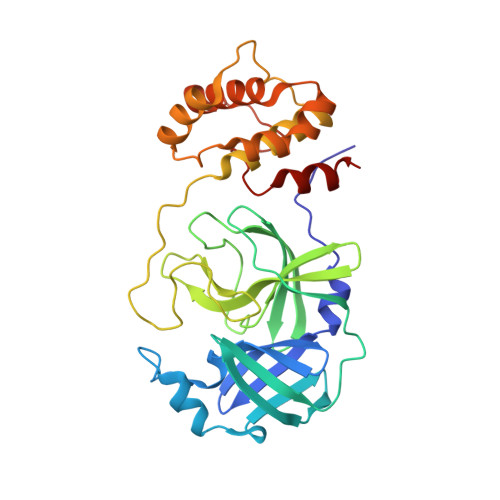Nature-inspired catalytic asymmetric rearrangement of cyclopropylcarbinyl cation.
Li, Q.H., Zhang, G.S., Wang, F., Cen, Y., Liu, X.L., Zhang, J.W., Wang, Y.H., Lee, A.W.M., Gao, D., Lin, G.Q., Tian, P.(2023) Sci Adv 9: eadg1237-eadg1237
- PubMed: 37163601
- DOI: https://doi.org/10.1126/sciadv.adg1237
- Primary Citation of Related Structures:
8GZB - PubMed Abstract:
In nature, cyclopropylcarbinyl cation is often involved in cationic cascade reactions catalyzed by natural enzymes to produce a great number of structurally diverse natural substances. However, mimicking this natural process with artificial organic catalysts remains a daunting challenge in synthetic chemistry. We report a small molecule-catalyzed asymmetric rearrangement of cyclopropylcarbinyl cations, leading to a series of chiral homoallylic sulfide products with good to excellent yields and enantioselectivities (up to 99% enantiomeric excess). In the presence of a chiral SPINOL-derived N -triflyl phosphoramide catalyst, the dehydration of prochiral cyclopropylcarbinols occurs rapidly to generate symmetrical cyclopropylcarbinyl cations, which are subsequently trapped by thione-containing nucleophiles. A subgram-scale experiment and multiple downstream transformations of the sulfide products are further pursued to demonstrate the synthetic utility. Notably, a few heteroaromatic sulfone derivatives could serve as "covalent warhead" in the enzymatic inhibition of severe acute respiratory syndrome coronavirus 2 main protease.
Organizational Affiliation:
The Research Center of Chiral Drugs, Shanghai Frontiers Science Center of TCM Chemical Biology, Innovation Research Institute of Traditional Chinese Medicine, Shanghai University of Traditional Chinese Medicine, 1200 Cailun Road, Shanghai 201203, China.
















